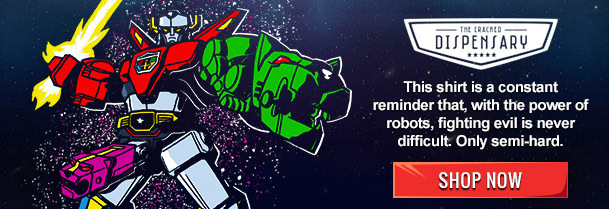4 Public Apologies That Weren't Good Enough

This is an age in which people can screw up on a large scale, then issue an apology through their press agent and quickly fade back into neutral in the eyes of the public. A simple "I'm sorry" lets them slip out of our minds, and even though we may not necessarily forgive them, their apology allows us to stop caring and move on. For some of those people, sure: continue to live your life of assholeary. But there are others whose apologies we shouldn't accept -- people whose sorries aren't good enough. We should generally be forgiving of our fellow humans, but not when it comes to ...
The Guy Who Invented Pop-Up Ads

Back in 1995, a man almost ruined the Internet before it became the wonder it is today. He was attempting to do something nice, but his creation went nuts, took over the world, and made visiting a common website in the early, Wild West days of the Internet a truly terrifying prospect. That man is Ethan Zuckerman, and he recently apologized for creating pop-up ads.

And by "creating," I mean he spilled the contents of an ad executive's head onto the Internet.
In a lengthy article in The Atlantic about the state of modern Internet advertising, Zuckerman outed himself as the man responsible for making sure that every website is basically a digital landmine that explodes with ads for dick-expanding drugs from the moment you land on it.
Advertising is intensely pervasive, yet there was a time when it could be ignored. So what did you do, Zuckerman? You created a form of advertising that abandons the placid, mostly ignorable ubiquity of traditional advertising and replaces it with commercials that explode onto eyeballs like poorly aimed cumshots. Your grand advertising scheme was to take the thing we all already thought was annoying and ram it into our heads like a demented older brother trying to touch a sibling with a finger covered in snot.

Difference is, you can't tell mom why all the pop-ups have boobs and vaginas.
There was once a time when trying to close a single pop-up would spawn even more pop-ups. Attempting to close those would open more, and so on, until the computer became paralyzed by an onslaught of advertising. We had to hack away at pop-up after pop-up like we were traversing a jungle thick with foliage to reach a lost city. But there was no lost city at the end, just our email account, or some run-of-the-mill porn. Your creation made the simple, intuitive nature of the Internet a massive, obnoxious chore. For that, you can blow your sorries out of your ass.
J.J. Abrams and His Lens Flares

J.J. Abrams' reboot of Star Trek was damn good. He took a franchise that had meandered into irrelevance and injected it with much needed excitement and fun. He made Star Trek interesting again, and not just with strong characters and a twisty, nonstop plot. He made the series visually interesting, which it almost never was. Before, the camera setups in a Star Trek episode or movie were about as dynamic as the camera work on an amateur sex tape. There was never any artistry attempted. Everything was stiff and lifeless, devoid of color and creativity. Before Abrams, Star Trek was a rice cake for your eyes.

Forty years of cinematography summed up with one shitty snack.
Yet, a lot of people walked out of that really fun, exciting movie unable to do anything but complain about lens flare. Ultimately, that's a good thing: Abrams made such a good movie that the biggest problem most viewers had is that the lights did a stretchy thing across the screen. That's a complaint most could live with ... other than Abrams, who apologized for the lens flares.
J.J., we shouldn't accept that apology because you shouldn't have apologized to begin with. Do you realize what's at the core of all the complaints about lens flare? What these people are really saying is, "I get distracted by lights. You know, like a baby or a cat." These are people who are admitting, in a roundabout way, that their attention spans can be obliterated by shiny things. They're telling you that if you were to find yourself in a torturous conversation with them, you could jingle your keys and throw them a few feet away and they'd chase them down, giving you the opportunity to get the hell out of there.

Admit it: you stared at this picture for seven minutes.
But all things in moderation, of course. Later in that same interview where you apologized for the lens flares, you said that in Star Trek Into Darkness there was a scene so loaded with lens flares your own wife couldn't understand what was happening. You had Industrial Light & Magic digitally remove some of them, which is a level of computer wizardry I can't comprehend. If someone as close as your wife is telling you to rein it in a little, listen and accept that maybe you've gone too far. But you don't have to apologize to random Internet people who drop what they're doing and frantically grab at a wall every time a passing car inadvertently reflects light into their home.
Subway and Their Short Footlongs

Sub sandwiches generally come in three sizes: 6 inches, for if you don't want to overstuff yourself; 1 foot, for if you want to feel full and satisfied for the many hours ahead; and "whale dick," for parties. Those exact three sizes and nothing more or less, with the foot-long being the standard size. Subway likes to claim that their subs are a foot long, because they've taken the independent words "foot" and "long" and, through billions of dollars of R&D, fused the words together into "Footlong," a word that describes not only the length of their sandwiches but the entire concept of a sub sandwich itself. They've proclaimed this fact -- this fact about how these Footlongs are, indeed, 12 inches of sandwich -- through a jihad of a commercial jingle that's only made worse by the professional athletes who sing the tune with all the enthusiasm of people who really hope no one ever watches these commercials.
So, if there's one thing we know for certain about the Earth and life and the universe, we know -- now and forever -- that Subway sandwiches are one foot in length.
Some guys from Australia measured a bunch of Subway Footlongs and found them to be only 11 inches. Two guys from New Jersey went to 17 different Subway locations and every sandwich they measured fell well short of the promised 12-inch mark. Subway eventually apologized for the shortness of their sandwiches, but not before trying to use one of the most pathetic semantic arguments you'll ever hear: they said that when they use the term "Footlong" it's "not intended to be a measurement of length," and that "Subway Footlong" is just a registered trademark.

People used their hands in commercials to measure the size of their fucking sandwiches!
Subway, you apologized for short-changing us with the bread. Great. Wonderful. Don't do it again. Blah blah blah. But you seem to have glossed over the part where you tried to convince humanity that the claim of a Footlong being a foot long should not be taken literally. Like we should all know it was just a joke; you were only kidding. Kind of like when I'm really hungry and I say, "I could eat a horse." I'm not going to eat a whole fucking horse. That's crazy. But apparently, I should also think it's insane to believe dough can be stretched beyond 11 inches. Trying to convince people the sole promise you've made to them is nothing more than a corporate slogan is a much worse offense than cutting out an inch of bread. For a moment, you thought the sandwich-eating peoples of the world were so stupid that they'd accept some shit pulled out of your ass as a valid explanation.

The Legend of Zelda: Ocarina of Time is widely considered to be one of the greatest, if not the greatest, video games ever made. I'm inclined to agree. It's nearly flawless in every respect, except for one: the goddamned Water Temple.
I played Ocarina of Time three times on the Nintendo 64 and haven't played it since. Looking back at my time playing Ocarina's Water Temple, all I remember is an angry, wadded fist of white-hot rage. No specific moments of trouble or annoyance -- just the pure, glowing essence of burning anger. I can look back and see the Deku Tree just fine. I can see the Spirit Temple with full clarity. But when I search the recesses of my mind for files detailing my time with the Water Temple, all I get is pictures of Sauron's eye from Lord of the Rings and old-timey newsreel footage of World War II bombing raids.

Oh, yeah! I remember that part!
For a while, I believed I was the only one who felt this way about the Water Temple. Over time, I met more and more people for whom the Water Temple was the first time they contemplated suicide over an inability to complete a task in a video game. So many people out there in the world hated the Water Temple that the game's director, Eiji Aonuma, apologized for not designing it as well as he could have.
Perhaps it's out of a childish resentment, but that apology cannot be accepted. Yes, Ocarina of Time was still incredible in spite of that one nightmare of a level -- a level in which using the wrong key on the wrong door could permanently fuck your progress, and needing to constantly swap your gear from your inventory to the button scheme all but ruined the rhythm the game so patiently and beautifully established, and having to constantly raise and lower the level of the water throughout the temple was an overly confusing mechanic that turned a game about an adventure through a magical land into something that felt like math homework. It's an ugly pock mark on an otherwise beautiful face. In my mind, the game is a 10, but a hesitant 10. Because, for one dungeon, everything great about the game was put away and replaced with tedium.

Completing the Water Temple has a lot in common with drowning.
There's a reason I don't remember the details of that level: I don't want to remember them. That's something a Zelda game should never do.
Luis is sorry for offending his mom with all the "fucks" in his articles. Follow him on Twitter and Tumblr.
For more from Luis, check out Dog Thong to iPaw: 15 Pet Products We Can't Believe Exist and 4 Ridiculously Obsessive 'Star Wars' Fan Tributes Ever.
